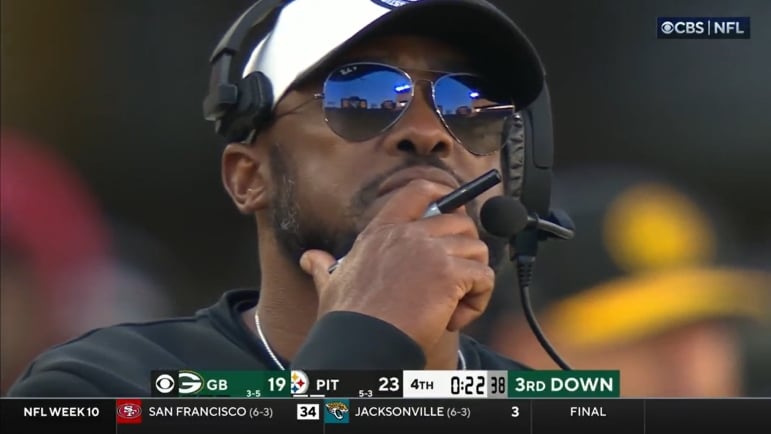For the past two offseasons, I’ve taken a look at the size of each NFL coaching staff. To see where the Pittsburgh Steelers stack up, identify league trends, and figure out if any of these matters.
For years, Pittsburgh has been criticized for not employing many coaches. They’ve preferred to have a very traditional “one coach for one position group” model. In our previous studies, the Steelers had among the smallest coaching staffs in football but not the tiniest.
Until 2024.
In 2022 and 2023, Bill Belichick and the New England Patriots had the smallest coaching staffs. With Jerod Mayo replacing him, the Patriots have become “modern age” and increased their staff from 18 coaches last season to 25 this year. Pittsburgh’s staff changed significantly, a new offensive coordinator, wide receiver coaches, quarterbacks coach, etc., but their total is the same – 19. That is now last in football.
Below is a table of each coaching staff size, broken down into offensive, defensive, and special teams coaches. I did not count those listed or employed as analysts or data collectors. This focused on those directly involved in coaching and training players and/or game planning. It also does not include strength and conditioning staff.
These breakdowns are mostly based on official titles. However, in some instances, I used team job descriptions and highlights to determine which bucket to place a coach into (i.e., an assistant coach with a defensive background was placed in the defensive category).
The data below with analysis to follow.
NFL Coaching Staff Sizes (2024)
| Team | Total Coaches | Off. Coaches | Def. Coaches | ST Coaches |
|---|---|---|---|---|
| Miami Dolphins | 27 | 13 | 11 | 2 |
| Las Vegas Raiders | 27 | 12 | 11 | 3 |
| San Francisco 49ers | 26 | 13 | 9 | 3 |
| Atlanta Falcons | 26 | 14 | 9 | 2 |
| Minnesota Vikings | 26 | 13 | 10 | 2 |
| Seattle Seahawks | 25 | 12 | 10 | 2 |
| Carolina Panthers | 25 | 12 | 10 | 2 |
| Green Bay Packers | 25 | 12 | 9 | 3 |
| Chicago Bears | 25 | 12 | 10 | 2 |
| Los Angeles Chargers | 25 | 12 | 10 | 2 |
| Houston Texans | 25 | 12 | 9 | 3 |
| New England Patriots | 25 | 12 | 9 | 3 |
| Washington Commanders | 24 | 11 | 10 | 2 |
| New York Giants | 24 | 10 | 10 | 3 |
| Denver Broncos | 24 | 12 | 8 | 3 |
| Jacksonville Jaguars | 24 | 11 | 10 | 2 |
| Indianapolis Colts | 24 | 10 | 10 | 3 |
| Tampa Bay Buccaneers | 23 | 12 | 8 | 2 |
| Dallas Cowboys | 23 | 11 | 8 | 3 |
| Philadelphia Eagles | 23 | 11 | 8 | 3 |
| Kansas City Chiefs | 23 | 11 | 9 | 2 |
| Tennessee Titans | 23 | 11 | 9 | 2 |
| Cleveland Browns | 23 | 12 | 8 | 2 |
| Baltimore Ravens | 23 | 12 | 7 | 3 |
| Los Angeles Rams | 22 | 10 | 9 | 2 |
| New Orleans Saints | 22 | 11 | 8 | 2 |
| Detroit Lions | 22 | 10 | 9 | 2 |
| Arizona Cardinals | 21 | 10 | 8 | 2 |
| Buffalo Bills | 21 | 10 | 8 | 2 |
| New York Jets | 21 | 10 | 8 | 2 |
| Cincinnati Bengals | 21 | 10 | 8 | 2 |
| Pittsburgh Steelers | 19 | 10 | 7 | 1 |
| NFL Average | 23.7 | 11.4 | 9.0 | 2.3 |
– In all three years, the Miami Dolphins have either tied or held an outright lead in coaching staff size. They’ve had 27 in all three years. For the first time since 2022, a team has matched that with Antonio Pierce, no longer an interim head coach, having 26 other coaches and himself to create a 27-man crew.
– Every single team has at least ten offensive coaches. But hardly more than one-third of the league, just 11 teams, have double-digit defensive coaches.
-The team with the most coaches on either side of the ball is the Atlanta Falcons, who employ a whopping 14 on their offensive staff. This is a new look under Raheem Morris, a defensive coach who has surrounded himself with plenty of offensive-minded input.
– Focusing on Pittsburgh. They have two fewer coaches than anyone else in football and are the only team under 21. While they have ten offensive coaches, which is at least tied with several teams for the fewest in football, they and the Baltimore Ravens have a league-low seven defensive coaches. Of course, the Steelers have a defensive-minded head coach in Mike Tomlin. It’s worth noting several teams with defensive head coaches have smaller defensive staffs (Todd Bowles in Tampa Bay, Sean McDermott in Buffalo, Robert Saleh in New York, Tomlin in Pittsburgh).
For all three years, they have continued to be the only team with one coach with a special teams title: coordinator Danny Smith. He certainly receives help, but no other coach has that official “Assistant Special Teams” title in his name. Pittsburgh’s had them in the past, but not recently.
As you can see at the bottom of the table, the Steelers have nearly five fewer coaches than the NFL average. That translates to 1.4 fewer offensive coaches, two fewer defensive coaches, and 1.3 fewer special teams coaches.
As mentioned above, the Patriots see big changes. In 2023, they had just eight offensive coaches, seven defensive coaches, and two special teams coaches. Add Belichick, and it was an 18-man group. This year, they have 12 offensive coaches, nine defensive coaches, and three special teams coaches, 25 in total with Jerod Mayo.
– Is there any correlation? In 2023, the bottom-seven teams with 21 or fewer coaches went a combined 54-65 (.454 winning percentage). Two of the seven, the Bills and Steelers, made the playoffs.
The top-five teams with 25 or more coaches went a combined 40-45 (.471 winning percentage). Only one of the five, the Miami Dolphins, made the playoffs.
The Super Bowl between the 49ers and Chiefs saw one team with an above-average coaching staff size (San Francisco’s 26) and a below-average coaching staff size (Kansas City’s 23).
While sample sizes are still limited, and I wouldn’t consider something this simple to be conclusive or definitive, it runs counter to what we tracked last offseason for the 2022 staffs. In last year’s study, the teams with the biggest coaching staffs did far better than the ones with the smallest. This year, the difference is negligible for the bigger coaching staffs. Perhaps I’ll dedicate a separate article diving into the data more.
So, while it will be easy and understandable to criticize the Steelers here, there isn’t an obvious correlation between coaching staff size and success. There are pros and cons to each. A larger coaching staff may be able to get more work done, but it also runs the risk of being more disorganized and having inconsistent messaging, while the head coach has more to manage on an already full plate.
– Finally, a look at the trend lines over the three years of my study.
NFL Coaching Staff Averages Year-by-year
| Year | Total Coaches | Offensive Coaches | Defensive Coaches | ST Coaches |
| 2022 | 21.7 | 9.8 | 8.4 | 2.3 |
| 2023 | 23.0 | 10.8 | 8.8 | 2.3 |
| 2024 | 23.7 | 11.4 | 9.0 | 2.3 |
– One thing we can confidently say is that coaching staffs are increasing in number. In totality, they’ve increased by two coaches from 2022 to 2024. Offensively, they’ve jumped by 1.5, while defense has gotten a smaller boost of a half-coach. Perhaps most interesting is special teams coaches staying the same throughout the three years.
Teams are hiring more coaches and focusing on the offensive side of the ball in this offense-driven world. On average, teams now employ nearly 2.5 more offensive coaches than their defensive counterparts.







